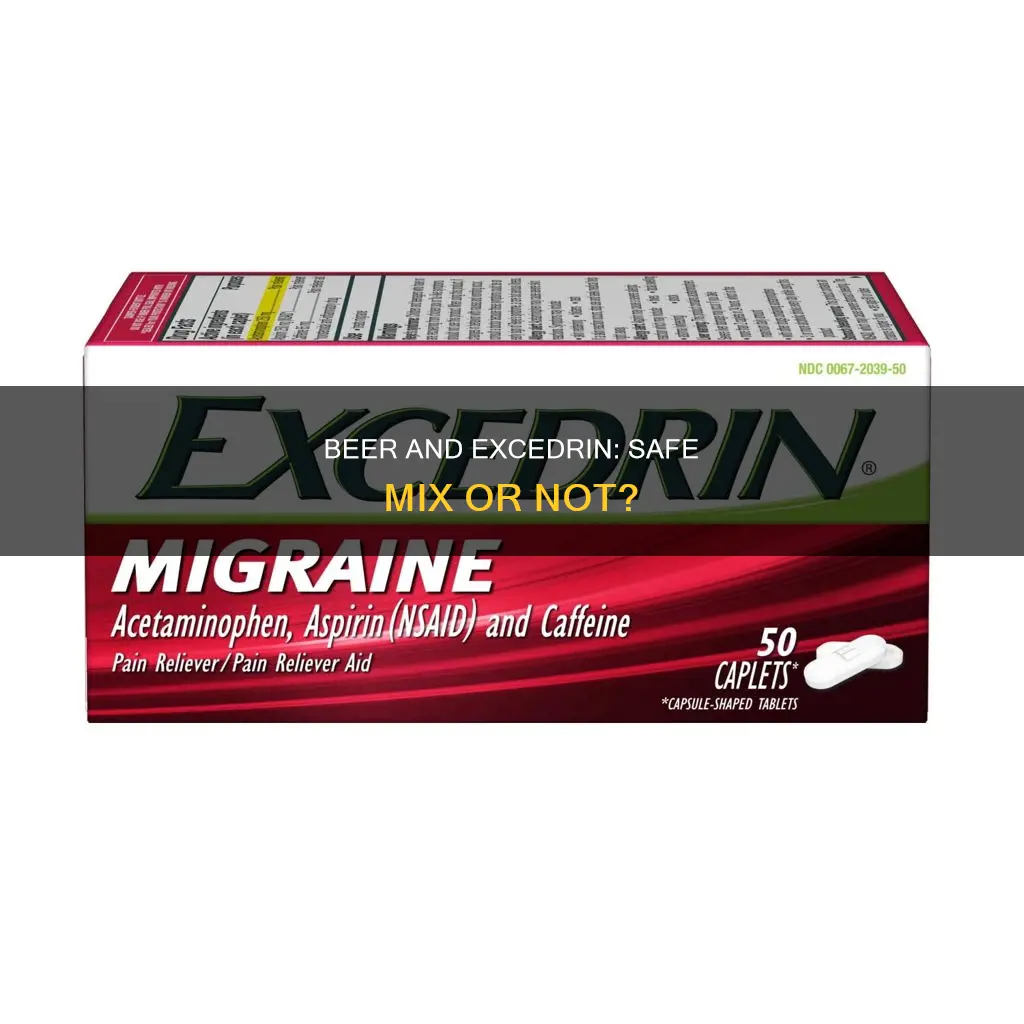
Drinking alcohol while taking Excedrin is not recommended. Excedrin products contain acetaminophen, and consuming three or more alcoholic drinks per day while using these products can lead to severe liver damage. Most Excedrin products also contain aspirin, an NSAID that may cause severe stomach bleeding, and the risk increases with the consumption of three or more alcoholic drinks per day. Additionally, alcohol can increase the risk of bleeding in the stomach and intestines caused by aspirin.
| Characteristics | Values |
|---|---|
| Drinking beer after having Excedrin | Not recommended |
| --- | --- |
| Reason | Excedrin contains acetaminophen, aspirin, and caffeine, which can cause serious side effects when mixed with alcohol, including liver damage and stomach bleeding |
| Symptoms of side effects | Fever, chills, joint pain or swelling, excessive tiredness or weakness, unusual bleeding or bruising, skin rash or itching, loss of appetite, nausea, vomiting, or yellowing of the skin or eyes |
| Who is at higher risk | People who drink more than 3 alcoholic beverages a day and those with liver disease or regular alcohol consumption |
What You'll Learn
- Mixing Excedrin with alcohol may cause liver damage
- Drinking alcohol with Excedrin may cause stomach bleeding
- Excedrin contains caffeine, which can cause nervousness, irritability, and sleeplessness
- Excedrin may interact with grapefruit juice, increasing caffeine side effects
- Excedrin may not work as well if you smoke while taking it

Mixing Excedrin with alcohol may cause liver damage
Excedrin is a medication that combines acetaminophen, aspirin, and caffeine to treat mild aches and pains. It is available over the counter and is commonly used to relieve headaches, including migraines and tension headaches. While Excedrin can be effective in managing pain, it is important to be aware of potential interactions and side effects, especially when mixing it with other substances like alcohol.
Mixing Excedrin with alcohol can lead to an increased risk of liver damage. This interaction is primarily due to the presence of acetaminophen in Excedrin, which can cause serious side effects when combined with ethanol (alcohol). The combination of these substances can negatively impact the liver, and the risk is higher for individuals who regularly consume three or more alcoholic drinks per day.
When acetaminophen and alcohol are mixed, the potential for hepatotoxicity increases. This means that the liver may experience toxic effects, leading to damage or impairment. In some cases, this combination can result in acute liver injury or even severe liver damage. Therefore, it is generally recommended to avoid consuming alcohol while taking Excedrin or other acetaminophen-containing medications.
If you are taking Excedrin, it is important to be vigilant for any signs or symptoms that may indicate liver problems. Contact your healthcare provider immediately if you experience symptoms such as right upper belly pain, loss of appetite, nausea, light-colored stool, dark yellow or brown urine, yellowing of the skin or eyes, or unusual weakness and fatigue. These could be indicators of liver injury or dysfunction.
Additionally, it is crucial to consult your doctor or healthcare provider before using Excedrin and alcohol together. They may provide specific instructions, dose adjustments, or special tests to ensure your safety. It is also essential to disclose all medications, vitamins, and supplements you are taking to your healthcare provider to avoid any harmful interactions.
Beer After Dinner: A Healthy Choice?
You may want to see also

Drinking alcohol with Excedrin may cause stomach bleeding
It is important to note that both Excedrin and alcohol can have negative effects on the liver. The acetaminophen in Excedrin can cause serious side effects that affect the liver when combined with ethanol (alcohol). Additionally, consuming three or more alcoholic drinks per day while taking Excedrin can increase the risk of liver damage. Therefore, it is recommended to limit or avoid alcohol consumption altogether when taking Excedrin to reduce the risk of liver injury.
The combination of Excedrin and alcohol can also increase the risk of other serious side effects. These side effects include fever, chills, joint pain or swelling, excessive tiredness or weakness, unusual bleeding or bruising, skin rash or itching, loss of appetite, nausea, vomiting, and yellowing of the skin or eyes. If any of these symptoms occur, it is important to contact a doctor immediately.
Furthermore, the caffeine in Excedrin can also have interactions with alcohol. While taking caffeine-containing medications, it is recommended to limit the consumption of other caffeine-containing foods and beverages, such as coffee, tea, and chocolate. Excessive caffeine intake can lead to negative effects such as nausea, nervousness, irritability, and sleeplessness.
In conclusion, drinking alcohol with Excedrin may cause stomach bleeding due to the interaction between alcohol and the aspirin in Excedrin. It is important to consult a doctor before combining Excedrin and alcohol to ensure safe consumption and avoid potential negative side effects.
Bottom-Fill Beer: How Does It Work?
You may want to see also

Excedrin contains caffeine, which can cause nervousness, irritability, and sleeplessness
Excedrin is a medication that contains acetaminophen, aspirin, and caffeine. The caffeine in Excedrin can cause nervousness, irritability, and sleeplessness, especially if consumed in excess.
Caffeine is a central nervous system stimulant, and consuming too much can lead to negative side effects. While Excedrin contains a relatively small amount of caffeine (65 mg per tablet), taking more than the recommended dose could result in excessive caffeine intake. This is especially true if you are also consuming other caffeine-containing products throughout the day.
To avoid potential side effects, it is important to follow the recommended dosage instructions for Excedrin. For adults, the recommended dose is two tablets in a 24-hour period, taken with a glass of water. It is important not to exceed this dosage unless directed by a doctor.
In addition to the potential for nervousness, irritability, and sleeplessness, excessive caffeine intake can also occasionally cause a rapid heartbeat. This is particularly important to consider if you have a heart condition or other cardiovascular issues.
If you are concerned about the amount of caffeine in Excedrin or how it may affect you, it is always best to consult with your doctor or healthcare provider. They can advise you on whether Excedrin is suitable for you and provide guidance on managing any potential side effects.
Do Beer Cozies Work? The Science Behind It
You may want to see also

Excedrin may interact with grapefruit juice, increasing caffeine side effects
Excedrin is a medication that contains acetaminophen, aspirin, and caffeine. It is important to be aware of how Excedrin may interact with other substances, including grapefruit juice and alcohol.
Grapefruit juice can affect how certain medications work, and this interaction can be a concern. Grapefruit juice can change the way drugs are metabolized in the body, leading to increased side effects or reduced drug effectiveness. Specifically, grapefruit juice can decrease the activity of the CYP3A4 enzyme, which is responsible for breaking down many drugs and toxins. This can result in higher levels of the drug in the body, potentially leading to increased side effects.
In the case of Excedrin, grapefruit juice may interact with the caffeine component, increasing caffeine's side effects. Caffeine at high dosages may be associated with positive inotropic and chronotropic effects on the heart. It can also produce an increase in systemic vascular resistance, resulting in elevated blood pressure. Therefore, consuming grapefruit juice with Excedrin may enhance these cardiovascular effects of caffeine.
It is important to note that the interaction between grapefruit juice and medications can vary depending on individual factors such as the specific drug, the amount of juice consumed, and the person's metabolism. The effects of grapefruit juice on drug metabolism can last for over 24 hours, so simply separating the consumption of grapefruit juice and medication may not be sufficient to avoid the interaction.
Regarding alcohol consumption after taking Excedrin, it is generally recommended to avoid drinking alcohol while taking medications containing aspirin, acetaminophen, or caffeine, as this can lead to adverse effects. Alcohol can increase the risk of stomach bleeding caused by aspirin, and combining alcohol with acetaminophen can cause liver damage. Additionally, alcohol and caffeine together can increase the risk of cardiovascular issues, as both substances can affect heart rate and blood pressure.
Therefore, it is advisable to consult a healthcare provider to understand the potential interactions and risks associated with consuming grapefruit juice or alcohol while taking Excedrin.
Breastfeeding and Beer: What's Safe?
You may want to see also

Excedrin may not work as well if you smoke while taking it
Drinking alcohol while taking Excedrin is not recommended. Excedrin contains acetaminophen, aspirin, and caffeine. Alcohol can increase the risk of stomach bleeding caused by aspirin. Mixing alcohol with acetaminophen can cause serious side effects that affect your liver. Combining alcohol with caffeine can increase blood pressure and heart rate. Therefore, caution should be exercised when consuming alcohol with Excedrin, and it is advisable to consult a doctor or medical professional for personalized advice.
Regarding smoking while taking Excedrin, there is limited information available specifically on the interaction between Excedrin and smoking. However, smoking can impact the effectiveness of medications in general. Nicotine from smoking can affect the way the body metabolizes drugs, altering their effectiveness. Additionally, smoking can increase the risk of certain side effects associated with medications.
Excedrin contains caffeine, and when combined with nicotine, the stimulating effects of both substances may be enhanced, potentially leading to increased heart rate, blood pressure, and restlessness. Therefore, smoking while taking Excedrin may reduce the medication's effectiveness and potentially increase specific side effects.
Furthermore, Excedrin is often used to treat headaches, and smoking can be a trigger for headaches and migraines. Smoking can constrict blood vessels in the brain, leading to head pain. Additionally, the carbon monoxide in cigarette smoke can reduce the amount of oxygen that reaches the brain, further contributing to head pain. Therefore, smoking while taking Excedrin may not only reduce the medication's effectiveness but also potentially worsen the condition it is intended to treat.
In conclusion, while there is no definitive information on the interaction between Excedrin and smoking, it is advisable to refrain from smoking while taking Excedrin. The combination may reduce the medication's effectiveness, increase specific side effects, and potentially worsen the condition being treated. Consulting a doctor or medical professional is recommended to obtain personalized advice regarding the use of Excedrin and smoking.
Beer and Brushing: What's the Deal?
You may want to see also
Frequently asked questions
No, it is not recommended to drink alcohol after taking Excedrin. Excedrin contains acetaminophen, aspirin, and caffeine, which can cause serious side effects when mixed with alcohol, including liver damage and increased risk of stomach bleeding.
Mixing Excedrin and alcohol can cause fever, chills, joint pain, excessive tiredness, unusual bleeding, nausea, vomiting, and yellowing of the skin or eyes. It can also increase the risk of stomach bleeding and liver damage.
It is recommended to consult a medical professional to determine how long to wait after taking Excedrin before consuming alcohol, as it depends on various factors such as age, sex, and the type of alcohol.
Drinking alcohol while taking Excedrin can lead to serious health risks. It is important to consult a doctor immediately if you experience any side effects or symptoms such as fever, nausea, or vomiting.
It is important to consult a medical professional to discuss alternative treatment options and determine if it is safe to consume alcohol with any medication.







